The Zero Hour
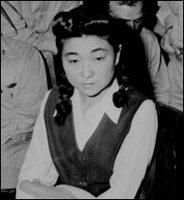 I was watching an old episode of the Simpsons, and there was a brief, cameo, whatever you call it,... an appearance of Tokyo Rose, working at a diner. For many people especially in the US, you hear of the name, Tokyo Rose, but do you actually know who this person was/is?
I was watching an old episode of the Simpsons, and there was a brief, cameo, whatever you call it,... an appearance of Tokyo Rose, working at a diner. For many people especially in the US, you hear of the name, Tokyo Rose, but do you actually know who this person was/is?
A while back, I did a brief search on her and found out a fascinating story. A Hollywood movie on it's own. And to my surprise, I've also read that George Takei (also known as Lt. or Captain Hikari Sulu in the StarTrek realm) may be in the works to actually produce a film about the life of Iva Toguri, better known as the person who was accused and convicted to be the infamous Tokyo Rose. I'm not sure if this project has actually taken off, since the article was from early 2004.
"Star Trek’s" Lt. Sulu plans to make his film, "Tokyo Rose: American Patriot," in Hawaii
In any case, with plenty of urban legends that surfaced after the Second World War, many believed (mostly the US government) Iva Toguri to be the one and only Tokyo Rose. Though there were many other English speaking female radio broadcasters at the time.l I'm sure that some of you may have heard the urban myth that Amelia Earhart may have been Tokyo Rose. Though, through the various radio recordings, no one was able to recognize her voice. And according to a online paper that was posted back in 1998, she's still living in the Chicago area. Born on July 4th, 1916 and time is ticking away before her story can be told. Since the article is 8 years old, I wonder if she' still around.
They Call Her Tokyo Rose, by Keith O'Brien
Here's a great site that also provides plenty of other links into her life.
Women's History: Iva Ikuko Toguri D'Aquino (Tokyo Rose, Orphan Ann)
Well anyways, instead of leaving you in the dark about her. I guess that I'll write a brief bio about Iva Toguri. I'll keep this really short. She was born in California, from Japanese parents, and her aunt on her mother's side was very ill, so she travelled to Japan to take care of her. Unfortunately, her mother couldn't go herself since she was also a tad ill as well. Off to Japan, without knowing much about the language. And then, the attack on Pearl Harbour. She's stuck in Japan. She ends up working for the national Japanese Radio station, amongst many other English speaking ladies. Her job was to help decrease the morale of US soldiers whom were stationed all around S.E Asia. A late night radio program call the Zero Hour, since it was broadcast at midnight, would play plenty of US classic tunes and have propaganda aired. Such verses telling soldiers that they should go home, since their wife is cheating on them.
After the war, she was charged with treason (more detailed info on other sites), arrested but then pardoned while later. I won't go into details since I'm too tired to type it down.. but check out the other sites, or do a search on her online. As facinating story in itself.
Hibachi? 火鉢? Mottainai? もったいない?
During my Language Salon gathering last night, a couple of words came up that were discussed. There are various English terms and Japanese terms that don't possess a direct translation or how certain words may mean something else. There are plenty of cases of that in every bloody language. Sure, there were plenty of cuss words we briefly discussed, but the two words I'd like to share with you are the words, "Hibachi" and "Mottainai".
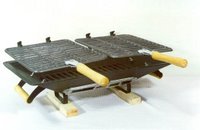
First off, I'm not sure if it's used else where in the world, but in the area where I grew up in Canada, the word hibachi was quite common. Nothing exotic about it. It was simply just a word. And you'd only ue it, when you were talking about one. Sure, we had our BBQs (Barbecue) but if you owned a small one, where the grill and charcoal holding container wasn't supported on a high stand, it was a hibachi set. When using a BBQ, you stand, and if you were using a hibachi set, it was eiter placed on the ground, or placed on the picnic table, and you sat by it. Hibachi sets are much cheaper to own since in N. America one tends to buy a BBQ set that is operated with Propane and other flammable liquids. In Japan, you can find cheap hibachi sets for less than 2000yen (18US)
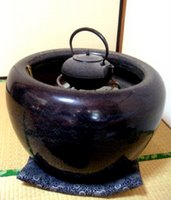 But in Japan, the word hibachi conjures up a totally different image. The word hibachi is said to be introduced to the English language in 1863, from the Japanese word hibachi, which literally means "firepot," from hi "fire" + bachi "bowl, pot. In Japan, a hibachi is more known as a traditional heating device. Usually a cylindrcal or box shaped container that contains ash and slow burning coal is placed inside to burn. Some people would simply use it to heat their homes (before modern heating, stoves) and some would stick a kettle on top to also boil some water to put moisture in the air or to simply have hot water. With a small grill, fish or rice cakes could also be grilled. But all in all, it's meant to be used as a means of keeping yourself warm. A pair of chopsticks stuck in the hibachi so that you can move the coals around. And when traditionally using a hibachi, you would only put in a handful of coals. Never a full bowl. Since that would simply be being spoiled.
But in Japan, the word hibachi conjures up a totally different image. The word hibachi is said to be introduced to the English language in 1863, from the Japanese word hibachi, which literally means "firepot," from hi "fire" + bachi "bowl, pot. In Japan, a hibachi is more known as a traditional heating device. Usually a cylindrcal or box shaped container that contains ash and slow burning coal is placed inside to burn. Some people would simply use it to heat their homes (before modern heating, stoves) and some would stick a kettle on top to also boil some water to put moisture in the air or to simply have hot water. With a small grill, fish or rice cakes could also be grilled. But all in all, it's meant to be used as a means of keeping yourself warm. A pair of chopsticks stuck in the hibachi so that you can move the coals around. And when traditionally using a hibachi, you would only put in a handful of coals. Never a full bowl. Since that would simply be being spoiled.
In North America, hibachi-style is also recognized as Teppanyaki-style (鉄板焼き). Which is seen more outside of Japan, than within Japan. Teppanyaki is the one where there's a large metal table that's heated and a chef comes along to cook and also entertain you at the same time. Sometimes, showing off his/her knife skills, slicing and dicing the meat in front of you, juggling utencils and other stuff.
So, quite the difference when it comes to the definition of a hibachi doesn't it?
 And now for the second word. Mottainai "もったいない". In the Japanese language, the word mottainai directly translated means "wasteful". It can also be used as a sentence on its own, then meaning more towards the line of "What a waste". And currently this Japanese word is now being used as the catchphrase by the 2004 Nobel Peace Prize, Wangari Maathai. But, the meaning/the content of what it represents has been slightly altered to assist her needs. First off, if you don't know yet, Wangari Maathai is a Kenyan environment and political activist, and is also the founder of the GBMI (Green Belt Movement International). And for those people who don't know of the GBMI, it all started as a grassroots non-governmental organization (NGO) with the idea of planting trees in Kenya. Through planting trees, the roots of the trees can help combat the ever growing desertification, floods (by absorbing water, and creating soil) and also address other issues of rights such as education, womens's rights, access to water, family planning and safe sex.
And now for the second word. Mottainai "もったいない". In the Japanese language, the word mottainai directly translated means "wasteful". It can also be used as a sentence on its own, then meaning more towards the line of "What a waste". And currently this Japanese word is now being used as the catchphrase by the 2004 Nobel Peace Prize, Wangari Maathai. But, the meaning/the content of what it represents has been slightly altered to assist her needs. First off, if you don't know yet, Wangari Maathai is a Kenyan environment and political activist, and is also the founder of the GBMI (Green Belt Movement International). And for those people who don't know of the GBMI, it all started as a grassroots non-governmental organization (NGO) with the idea of planting trees in Kenya. Through planting trees, the roots of the trees can help combat the ever growing desertification, floods (by absorbing water, and creating soil) and also address other issues of rights such as education, womens's rights, access to water, family planning and safe sex.
Anyways, Wangari Maathai is utilizing the Japanese word Mottainai to represent the Four R's. Yeah, that's right. It's no longer the three R's in which so many people have been taught. Reduce, Reuse, Recycle, and finally Repair. Though, one can easily argue that Repairing is the same as Reusing. Nevertheless, it's all useful to keep in mind. Mottainai: The Four R's (Reduce, Reuse, Recycle, ...and Repair) Many of the local Japanese couldn't believe me when I stated that there are people in Germany, Ireland, Netherlands, the UK and others that now utilize the word mottainai as part of their vocabulary. I hope that the people who attend my evening gatherings will now feel some pride that a word from their native language is now starting to be used all over the world to represent a worthy cause.
And now, I hope that some Japanese people have learnt a lesson from a word from their own vocabulary.
Reduce, the amount of disposable items you can purchase in Japan.
Reuse, those working electronics instead of constantly buying new items. (Though, there are many more second-hands shops in Japan since I was last here 9 years ago) Recycle, as much as you can. And fortunately, I find that there's much recycling here in Japan, but I must admit that there would be less need to recycle if they simply just reduced using soo many disposable products.
and finally,
Repair, things that are broken instead of buying the flashy brand new stuff. Everybody here is so into the new New NEW.
The Last Ninja?
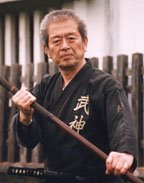
Last night during my weekly Language Salon (a gather of youths that wish to interact, meet, and share each others cultures. Not really a place to learn English, an what not, but a place to make friends, and for local Japanese to make foreign friends. It's NOT a freak'n dating service) gathering at the Soliel (City of Sanjo, Community Youth Centre) we came to the topic of Ninjas for some apparent reason.
Masaaki Hatsumi, is known to be the last surviving ninja instructor. If you search the web, you can also find old video footages of him training with the last combat ninja Toshitsugu Takamatsu (whom was involved in espionage in Manchuria, back in the early 1900s).
Here's also a recent article about him, by Hans Greimel ASSOCIATED PRESS. You can read it on either Canoe.ca or on the Mercury News.
Here's a link to his homepage.
Bujinkan
I find it unfortunate that there aren't many Japanese people more involved, and wanting to understand the way of the ninja. Sure, films have really idolized the ninja overseas, but here in Japan, I find that many present japanese youths view ninjas as a slave to their master. Hence forth, at Masaaki Hatsumi's
Bujinkan, there are more foreigners learning the trade. Pretty soon, the next mastery of the art Ninja may fall onto the lap of a non-Japanese. I guess that you could partly say that this is the part of the wonders of internationalization.
Judo and Sumo once being a very Japanese sport is now being dominated by foreigners. Not allowing foreigners to compete, but are now an international sport. Japan is no longer the almighty power-house of Judo. Sure, they still retain many of the titles, but countries such as France are winning more and more. Along with Canada, US, Russia, Germany, etc.
Watch Sumo on television, and you'll be surprised to see that almost half of the Sumo wrestlers are NOT japanese. Many Korean, Pacific Islanders, and recently a growing number of Eastern European athletes. The sumo wrestling ring (dohyō) [土俵] was once sacred ground. But now, foreigners dominate it.
Once again, I've totally veered off into a different direction of topic from where I originally started.
The Code and Hollywood?
I recently went to go see "The DaVinci Code" here in Japan. I read the book last year while living in Ireland just to see what the whole hype is/was about. While reading this book, I was taking back to my highschool days of when I was a bit into the whole conspiracy theories and unknown realm.
The first thought that ran through my mind while reading "The DaVinci Code" was, that this is a completely plagiarized novel. Well, not the whole thing but the main idea of it is taken from other materials, and the research is simply written and presented in a fictional and more entertaining matter. Though, part way through the book, the character Sir Leigh Teabing, played by Ian McKellen (who I must say is a great actor, and did a pretty good job of representing a slightly fanatical billionaire. Can't say that it was Audrey Tauou's best performance... she seemed to be a tad rigid in the film for me, I'm not sure if serious roles fit her character, though she has been type-cast into certain more light-hearted, innoccent roles) mentions about a published novel that provide a great insight into the so-called "Royal Bloodline".
 I recall reading The Holy Blood and the Holy Grail by Michael Baigent, Richard Leigh and Henry Lincoln back in high school, along with the sequel, The Messianic Legacy. This book goes into great detail and research in the search for the holygrail. And much of the ideas and even locations are mentioned in Dan Brown's DaVinci Code. These books were published back in the 80s, and are making quite a comeback now funnily enough. Though, the authors unsuccessfully sued Dan Brown for their material back in April of 2006. Just for side note... just to spur up the whole conspiracy thing, and fun with anagrams, did you realise that the character Sir Leigh Teabing's surname (who mentions Michael Baigent's book) is also an anagram for Michael Baigent's surname? T-E-A-B-I-N-G, B-A-I-G-E-N-T?... Things like this always put a smile on my face. Was this a deliberate act on Dan Brown's part, or just a freakish coincidence?
I recall reading The Holy Blood and the Holy Grail by Michael Baigent, Richard Leigh and Henry Lincoln back in high school, along with the sequel, The Messianic Legacy. This book goes into great detail and research in the search for the holygrail. And much of the ideas and even locations are mentioned in Dan Brown's DaVinci Code. These books were published back in the 80s, and are making quite a comeback now funnily enough. Though, the authors unsuccessfully sued Dan Brown for their material back in April of 2006. Just for side note... just to spur up the whole conspiracy thing, and fun with anagrams, did you realise that the character Sir Leigh Teabing's surname (who mentions Michael Baigent's book) is also an anagram for Michael Baigent's surname? T-E-A-B-I-N-G, B-A-I-G-E-N-T?... Things like this always put a smile on my face. Was this a deliberate act on Dan Brown's part, or just a freakish coincidence?
One of my favourite books also mentions The Holy Blood and the Holy Grail, Umbero Eco's novel, Foucault's Pendulum. (Though only briefly, and as a chapter header quote) Personally, I would say that Foucault's Pendulum is a more intelligent person's DaVinci Code. Though, even before, HBHG and FP, Robert Shea and Robert Anton Wilson came out with a great satirical series, The Illuminatus! Trilogy. Robert Anton Wilson also wrote a few more books, the Historical Illuminatus Chronicles, which are all fiction with a great possible fact influence. He certainly allows your mind to wander. Books I actually brought to Japan with me.
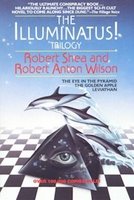 One of my favourite concepts risen from the Illuminatus Trilogy is about Henry Ford (the founder of the Ford Motor Company) whose grand master plan was to destroy the world! hee hee. Another side, note... did you know that Henry Ford was apparently a good friend of Hitler? (supposedly gave financial support to the Nazi party in the 30s?) and supposedly Henry Ford considered the first Model-T to run on Hemp oil... Another sure-fire way to start a Hemp/Nazi Conspiracy. tee hee hee. There's also ideas on how Henry Ford was really trying to destroy the world, (theories that he was a member of a secret society, the Golden Apple [the golden apple of discord which comes from greek mythology from the Judgement of Paris])and he helped that by introducing the assembly plant for automobiles.... Everybody want's one, and will also help contribute to the destruction of the world.
One of my favourite concepts risen from the Illuminatus Trilogy is about Henry Ford (the founder of the Ford Motor Company) whose grand master plan was to destroy the world! hee hee. Another side, note... did you know that Henry Ford was apparently a good friend of Hitler? (supposedly gave financial support to the Nazi party in the 30s?) and supposedly Henry Ford considered the first Model-T to run on Hemp oil... Another sure-fire way to start a Hemp/Nazi Conspiracy. tee hee hee. There's also ideas on how Henry Ford was really trying to destroy the world, (theories that he was a member of a secret society, the Golden Apple [the golden apple of discord which comes from greek mythology from the Judgement of Paris])and he helped that by introducing the assembly plant for automobiles.... Everybody want's one, and will also help contribute to the destruction of the world.
Dan Brown also has another book out, and it's totally about the Illuminati,... Angels and Demons. Haven't read it yet. Also I think that the film, National Treasure starring Nicolas Cage also features the Illuminati... the infamous, eye in the pyramid... Ahhh... it's all becoming hollywood.
Remember the movie Skulls? starring Joshua Jackson? Well, according to Antony C. Sutton that secret society presented in the film, actually known as the Skull and Bones might be an American chapter of the Illuminati. Skull and Bones being a secret society that started at Yale Univerity back in 1832. And yup... you got it, current US president George W. Bush and even Senator John Kerry as members. Just for more mind-f*ck fun facts, according to reports on the net, Bush reportedly appointed 11 Skull and Bone members to his adminstration in his first term.
Ohhhhh! It's all interconnected! How scary... tee hee.
Anyways... I think that I've wasted too much time. Don't even think that most of you will get through most of the links either. Anyways... hope you all have a great weekend.
Thoughts for the moment.

As June soon approaches my mind is constantly on the go with various thoughts. Not only will I be heading off to Ireland, but I've got a few things I'll have to plan. At times like these, I find myself constantly online, checking up on flight schedules, fares, trains, buses and you know what? It's pretty darn stressful, but I enjoy it. Sure, it'd probably be easiest if I went with a travel agent, but some times I find myself knowing a few more tricks of the trade.
So, what's on my mind for the time being? Well, other than work for course.
- which route to take to visit Ennis (Ireland), Glasgow/Edinburgh (Scotland), and Bridgewater (England).
which airlines to fly with, which airport to go to...
- where to hire a car from, and for how long.
- what to bring with me to Ireland and the UK.
- why am I heading over there?
Ennis - to see my gf of course.
Scotland - to catch up with friends I haven't seen in over a year.
Bridgewater - to purchase/ pick up a new bicycle.
- which bike to purchase
Surly LHT frame only (frame imported from US, but apparently built in China) [$400US+shipping]
Thorn Sherpa (cheapest Thorn touring bicycle, but frame from China again?) [£700]
Thorn Nomad (great touring bike, built in the UK) [£1200]
Bruce Gordon BLT (great touring bike, built in the US) [$2000US]
etc. etc.
I'm sure that there's plenty of you reading now, who aren't interested in bicycles at all. But, there are so many various factors to consider.
Do I ship stuff in from the US, pay for the shipping and then possibly custom charges.
Do I try and get stuff while I'm in the UK, which would negat much of the shipping charges and possibly even get it duty free? etc. etc.
Yeah, I know... my mind is being plagued by menial crap.
Switch-a-roo!
Well, as you can see I've started another bloody blog! The only reason for this change is because my Yahoo 360° blog was sorta a pain in the arse. Only allowing single photos per entry, limiting it's size and with not much option with altering the format and layout of your actual blog.So, here I am...
 I was watching an old episode of the Simpsons, and there was a brief, cameo, whatever you call it,... an appearance of Tokyo Rose, working at a diner. For many people especially in the US, you hear of the name, Tokyo Rose, but do you actually know who this person was/is?
I was watching an old episode of the Simpsons, and there was a brief, cameo, whatever you call it,... an appearance of Tokyo Rose, working at a diner. For many people especially in the US, you hear of the name, Tokyo Rose, but do you actually know who this person was/is?







